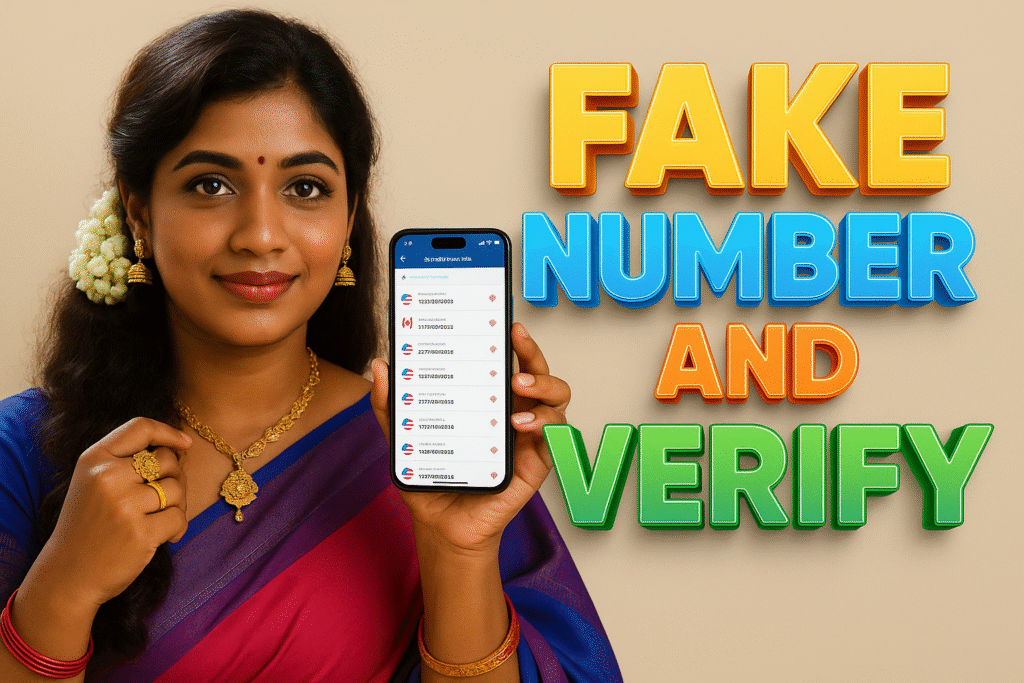Have you ever needed to register on a website or app but didn’t want to share your personal mobile number? That’s where fake numbers and verification codes (OTP codes) come in. Many users today use temporary phone numbers or virtual numbers to protect their privacy while still completing verification steps.
But what exactly are these fake numbers, how do they work, and what are the risks? Let’s explore everything in detail.
📱 What Is a Fake Number?
A fake number (also called a virtual number or temporary phone number) is a non-permanent phone number that can receive text messages or calls online.
It’s often used to:
- Receive OTP (One-Time Password) messages for verification
- Sign up for apps or websites without using your real SIM card number
- Avoid spam or unwanted marketing calls
These numbers are usually provided by online services or apps such as:
- TextNow
- 2ndLine
- Receive-SMS-Online
- iPlum
- Hushed
- Google Voice (in some countries)
🔍 How Does a Verify Code Work?
When you register on apps like WhatsApp, Instagram, or Telegram, they send a verification code (usually a 6-digit OTP) to confirm your identity.
Here’s how it works:
- You enter a mobile number.
- The app sends an SMS with a code.
- You type that code to verify that you own the number.
If you use a fake or virtual number, that code is received online through the website or app providing that number. It’s useful for testing, but not all services accept these numbers.
🧩 Why People Use Fake Numbers
| Reason | Explanation |
|---|---|
| 🔒 Privacy Protection | Hide your real number when testing apps or signing up for websites. |
| 🧪 Testing Accounts | Developers and marketers use fake numbers for demo or QA testing. |
| 💬 Avoid Spam | Prevent spam SMS or telemarketing calls on your real phone. |
| 🌍 International Access | Get numbers from other countries for cross-region testing or messaging. |
⚠️ Risks of Using Fake Numbers
Using fake or public numbers might seem safe, but it comes with serious privacy and security risks:
- Data Exposure: Anyone can read OTPs sent to public SMS sites.
- Account Theft: If someone reuses the same number, they can access your account.
- Service Ban: Platforms like WhatsApp and Facebook often block virtual numbers.
- Legal Issues: Using fake numbers for fraud, scams, or impersonation is illegal.
👉 Tip: Use fake numbers only for testing or temporary purposes—never for your real accounts or banking apps.
⚖️ Legal Aspects of Using Fake Numbers in India
In India, using a fake number for illegal activities (fraud, impersonation, identity theft, etc.) violates the Information Technology Act, 2000.
However, using virtual numbers for testing or business verification with proper consent is legal.
- ❌ Illegal: Creating fake social media accounts or OTP fraud.
- ✅ Legal: Testing app login flows or using paid business number services.
Always use legitimate virtual number providers and check their privacy policy.
🛡️ How to Safely Use Virtual or Temporary Numbers
- Use trusted apps from the Play Store (with verified developers).
- Avoid public SMS websites—they expose all messages to everyone.
- Never use fake numbers for banking, UPI, or government portals.
- Prefer paid secure services with private numbers (like iPlum, Hushed).
- Always read app privacy policies before sharing data.
🧠 Difference Between Fake and Virtual Numbers
| Feature | Fake Number | Virtual Number |
|---|---|---|
| Ownership | Public / Shared | Private / Personal |
| Cost | Free | Paid |
| Security | Low | High |
| Purpose | Testing / Temporary use | Business / Long-term use |
💡 Best Apps for Virtual Number Verification (2025)
| App Name | Key Feature | Available On |
|---|---|---|
| iPlum | US & Canada numbers, secure texting | Android / iOS |
| TextNow | Free number for texting & calling | Android / iOS |
| Hushed | Temporary private number | Android / iOS |
| 2ndLine | Business line with call recording | Android |
| Google Voice | US-based number integration | Android / Web |
🧾 Example Use Case
Let’s say you’re testing an app that requires OTP verification. Instead of giving your real number, you can use a temporary number from Hushed or iPlum.
You’ll receive the code inside that app — and once your test is done, the number can be deleted.
This protects your privacy without risking your personal data.
❓ Frequently Asked Questions (FAQs)
Q1. Is using a fake number illegal in India?
➡️ Only if it’s used for fraud, scams, or impersonation. Using for testing or privacy protection is fine.
Q2. Can I use a fake number for WhatsApp verification?
➡️ Sometimes possible, but WhatsApp bans such numbers frequently.
Q3. Are online OTP websites safe?
➡️ No. Messages are public, and anyone can read your verification codes.
Q4. What’s the safest way to use a fake number?
➡️ Use trusted apps like Hushed or iPlum, and never for sensitive accounts.
Q5. Can fake numbers receive phone calls?
➡️ Some apps allow call forwarding or voicemail using virtual numbers.
🏁 Conclusion
Fake numbers and verification codes can be useful tools for privacy and testing—but they also carry security and legal risks if misused.
Always use trusted services and avoid public SMS websites to stay safe.
If you just need privacy, go for paid, secure, and private virtual numbers that follow data protection laws.
More Articles You May Like







